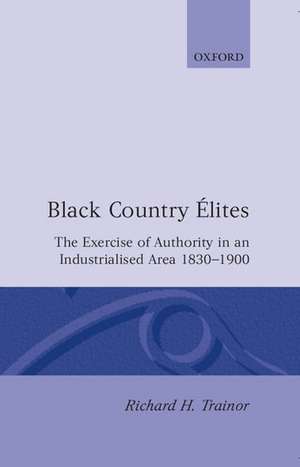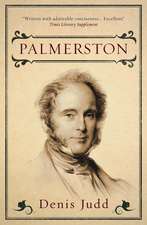Black Country Élites: The Exercise of Authority in an Industrialized Area, 1830-1900: Oxford Historical Monographs
Autor Richard H. Trainoren Limba Engleză Hardback – 30 dec 1993
Din seria Oxford Historical Monographs
- 22%
 Preț: 497.81 lei
Preț: 497.81 lei - 12%
 Preț: 310.34 lei
Preț: 310.34 lei - 30%
 Preț: 539.99 lei
Preț: 539.99 lei - 30%
 Preț: 497.63 lei
Preț: 497.63 lei - 13%
 Preț: 532.53 lei
Preț: 532.53 lei - 15%
 Preț: 244.01 lei
Preț: 244.01 lei - 30%
 Preț: 499.46 lei
Preț: 499.46 lei - 25%
 Preț: 556.27 lei
Preț: 556.27 lei - 30%
 Preț: 498.68 lei
Preț: 498.68 lei - 30%
 Preț: 604.98 lei
Preț: 604.98 lei - 30%
 Preț: 498.68 lei
Preț: 498.68 lei - 24%
 Preț: 496.31 lei
Preț: 496.31 lei - 19%
 Preț: 497.26 lei
Preț: 497.26 lei - 30%
 Preț: 499.46 lei
Preț: 499.46 lei - 30%
 Preț: 497.67 lei
Preț: 497.67 lei - 30%
 Preț: 500.29 lei
Preț: 500.29 lei - 13%
 Preț: 533.57 lei
Preț: 533.57 lei - 25%
 Preț: 569.72 lei
Preț: 569.72 lei - 30%
 Preț: 610.82 lei
Preț: 610.82 lei - 34%
 Preț: 1153.34 lei
Preț: 1153.34 lei - 51%
 Preț: 614.88 lei
Preț: 614.88 lei - 34%
 Preț: 1195.31 lei
Preț: 1195.31 lei - 34%
 Preț: 1035.84 lei
Preț: 1035.84 lei - 34%
 Preț: 1006.40 lei
Preț: 1006.40 lei - 29%
 Preț: 864.39 lei
Preț: 864.39 lei - 34%
 Preț: 1160.09 lei
Preț: 1160.09 lei - 34%
 Preț: 1432.67 lei
Preț: 1432.67 lei - 31%
 Preț: 328.46 lei
Preț: 328.46 lei - 34%
 Preț: 574.40 lei
Preț: 574.40 lei - 34%
 Preț: 1067.93 lei
Preț: 1067.93 lei - 34%
 Preț: 1004.67 lei
Preț: 1004.67 lei - 31%
 Preț: 331.22 lei
Preț: 331.22 lei - 34%
 Preț: 1153.28 lei
Preț: 1153.28 lei - 34%
 Preț: 1254.66 lei
Preț: 1254.66 lei - 34%
 Preț: 962.63 lei
Preț: 962.63 lei - 34%
 Preț: 946.79 lei
Preț: 946.79 lei - 34%
 Preț: 1126.38 lei
Preț: 1126.38 lei - 31%
 Preț: 469.27 lei
Preț: 469.27 lei - 23%
 Preț: 332.04 lei
Preț: 332.04 lei - 28%
 Preț: 375.23 lei
Preț: 375.23 lei - 34%
 Preț: 1049.14 lei
Preț: 1049.14 lei - 34%
 Preț: 1036.73 lei
Preț: 1036.73 lei - 51%
 Preț: 757.67 lei
Preț: 757.67 lei - 34%
 Preț: 1082.61 lei
Preț: 1082.61 lei - 34%
 Preț: 1155.39 lei
Preț: 1155.39 lei - 31%
 Preț: 328.53 lei
Preț: 328.53 lei - 34%
 Preț: 1110.12 lei
Preț: 1110.12 lei - 31%
 Preț: 487.75 lei
Preț: 487.75 lei - 34%
 Preț: 1153.41 lei
Preț: 1153.41 lei - 34%
 Preț: 1157.21 lei
Preț: 1157.21 lei
Preț: 375.09 lei
Preț vechi: 540.93 lei
-31% Nou
Puncte Express: 563
Preț estimativ în valută:
71.78€ • 77.94$ • 60.30£
71.78€ • 77.94$ • 60.30£
Carte tipărită la comandă
Livrare economică 12-18 aprilie
Preluare comenzi: 021 569.72.76
Specificații
ISBN-13: 9780198203551
ISBN-10: 0198203551
Pagini: 456
Ilustrații: 4 plates, line figures, map, tables
Dimensiuni: 143 x 223 x 30 mm
Greutate: 0.73 kg
Editura: Clarendon Press
Colecția Clarendon Press
Seria Oxford Historical Monographs
Locul publicării:Oxford, United Kingdom
ISBN-10: 0198203551
Pagini: 456
Ilustrații: 4 plates, line figures, map, tables
Dimensiuni: 143 x 223 x 30 mm
Greutate: 0.73 kg
Editura: Clarendon Press
Colecția Clarendon Press
Seria Oxford Historical Monographs
Locul publicării:Oxford, United Kingdom
Recenzii
This is a substantial, wide-ranging, deeply researched and densely argued study of elites in the provincial industrial towns of nineteenth-century England ... an important book which provides fuel for many debates as well as raising questions of its own.
'This book fills a number of gaps in the social history of nineteenth-century England ... it is a longitudinal study covering almost the entire Victorian era ... Trainor's book is among the best new publications on the English middle classes ... a true treasure-trove for anyone interested in the details of this study, or the local history of the towns under discussion. All in all, this is a highly stimulating book of outstanding scholarly value, great depth, and fascinating detail.'German Historical Institute London Bulletin, Volume XVI, No. 3, November 1994
'it is refreshing to read Richard H. Trainor's book ... Richard H. Trainor has written an adventurous and deeply-informed book. His research and knowledge are outstanding ... It is well written, extensively researched, thoughtfully argued and stimulating.'Carl Chinn, University of Birminhgam, Labour History Review, Vol. 59, No. 3, Winter 1994
His long-awaited monograph provides a comprehensive study of the Black Country 'elites', and takes its place beside a growing number of regional studies of the urban middle class. Trainor sets out his case by skilfully interweaving a vast range of archival and parliamentary sources with a well-developed secondary literature, and numerous unpublished theses. ..a study which is unlikely soon to be bettered for this regional elite.
richly researched, detailed, and statistically documented investigation of Black Country elites...Trainor's study of the Black Country elites provides a rehearing, and furthermore it indicates the robustness of detailed studies of local exercise of authority within the changing field of British social history.
This book is an extremely detailed and thorough examination of the authority wielded by individuals holding leadership posts in the major institutions of the Black Country...Richard Trainor intends his book to be a contribution to the role that the leaders of the industrial provinces play in Victorian society, and indeed, it is a valuable addition to the literature on this subject...The author is to be congratulated on producing such a wide-ranging and deeply researched book...an impressive piece of work, of great value not only to Black Country historians, but also to historians interested in social change in the industrial provinces of Britain in the nineteenth century.
The picture which Trainor paints of the Black Country elites is an attractive one...Dr Trainor will be perceptive enough to recognise that he has written a controversial book...it is a generous book, which recognises the contribution of other scholars even where the author disagrees with them. This is unusual enough these days to be worth recording...He displays formidable forensic skills to support his equally formidable scholarship. And he writes good, clear English. His book is a major contribution to our understanding of the nineteenth-century Black Country...one of the most important and welcome American American visitors to the Black Country.
Abundant material backs rounded judgements, conveyed in consistently clear, straightforward language
Richard H. Trainor's monograph - a feat of impressive scholarship, it should be said at the outset - comprises a welcome contribution to this historiographical trend.
'This book fills a number of gaps in the social history of nineteenth-century England ... it is a longitudinal study covering almost the entire Victorian era ... Trainor's book is among the best new publications on the English middle classes ... a true treasure-trove for anyone interested in the details of this study, or the local history of the towns under discussion. All in all, this is a highly stimulating book of outstanding scholarly value, great depth, and fascinating detail.'German Historical Institute London Bulletin, Volume XVI, No. 3, November 1994
'it is refreshing to read Richard H. Trainor's book ... Richard H. Trainor has written an adventurous and deeply-informed book. His research and knowledge are outstanding ... It is well written, extensively researched, thoughtfully argued and stimulating.'Carl Chinn, University of Birminhgam, Labour History Review, Vol. 59, No. 3, Winter 1994
His long-awaited monograph provides a comprehensive study of the Black Country 'elites', and takes its place beside a growing number of regional studies of the urban middle class. Trainor sets out his case by skilfully interweaving a vast range of archival and parliamentary sources with a well-developed secondary literature, and numerous unpublished theses. ..a study which is unlikely soon to be bettered for this regional elite.
richly researched, detailed, and statistically documented investigation of Black Country elites...Trainor's study of the Black Country elites provides a rehearing, and furthermore it indicates the robustness of detailed studies of local exercise of authority within the changing field of British social history.
This book is an extremely detailed and thorough examination of the authority wielded by individuals holding leadership posts in the major institutions of the Black Country...Richard Trainor intends his book to be a contribution to the role that the leaders of the industrial provinces play in Victorian society, and indeed, it is a valuable addition to the literature on this subject...The author is to be congratulated on producing such a wide-ranging and deeply researched book...an impressive piece of work, of great value not only to Black Country historians, but also to historians interested in social change in the industrial provinces of Britain in the nineteenth century.
The picture which Trainor paints of the Black Country elites is an attractive one...Dr Trainor will be perceptive enough to recognise that he has written a controversial book...it is a generous book, which recognises the contribution of other scholars even where the author disagrees with them. This is unusual enough these days to be worth recording...He displays formidable forensic skills to support his equally formidable scholarship. And he writes good, clear English. His book is a major contribution to our understanding of the nineteenth-century Black Country...one of the most important and welcome American American visitors to the Black Country.
Abundant material backs rounded judgements, conveyed in consistently clear, straightforward language
Richard H. Trainor's monograph - a feat of impressive scholarship, it should be said at the outset - comprises a welcome contribution to this historiographical trend.










